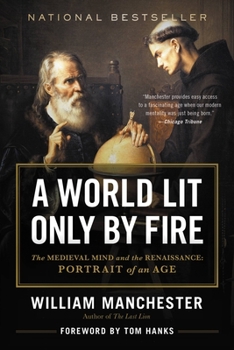A World Lit Only by Fire: The Medieval Mind and the Renaissance: Portrait of an Age
Select Format
Select Condition 
Book Overview
Updated with a new foreword by Tom Hanks: acclaimed historian William Manchester A World Lit Only by Fire is a "captivating and marvelously vivid" popular history of the Middle Ages (Publishers Weekly). From tales of chivalrous knights to the barbarity of the Inquisition and the misery of the Black Death, no era has been a greater source of awe, horror, and wonder than the Middle Ages. In graceful prose, and with the authority...
Format:Paperback
Language:English
ISBN:0316545562
ISBN13:9780316545563
Release Date:June 1993
Publisher:Back Bay Books
Length:352 Pages
Weight:0.81 lbs.
Dimensions:1.0" x 5.4" x 8.1"
Customer Reviews
6 ratings
A World Lit only by Fire - worth the read
Published by Jim D , 2 years ago
The book, A World Lit Only Fire, was more than the just a historical background of Europe, I really appreciated the background of the Catholic Church. The book showed the failures of the church, were are Christians often engaged in idol worship, the average lay person really had no understanding of what Christianity was, and the nearer to Rome someone lived the less religious they were. Perhaps this was the result of Constantine making Christianity the official religion of the Roman Empire. After which positions in the church were often times not a calling but a corrupt career choice.
I did find it interesting how as Manchester pointed out there was a a great deal of difference in the lives of people between the year 1791 and 1991 but there was very little difference in peoples lives that lived between the years 791 and 991. Some of the examples that come to mind were the lack of surnames, people never traveling but a few miles from where they were born, and no awareness of time. There were no clocks, no calendars, the only time that mattered was the change in the seasons.
I also appreciated finding out that great minds such as Leonardo da Vinci never had a university degree, and their intellect seem to be based upon an interdisciplinary understanding of a number of fields. Quite different than what our educational system today seems to embrace.
The book is deep, is based upon a large amount of source material, and well worth the time to read.
Manchester did what he set out to do, write a good book.
Published by Thriftbooks.com User , 19 years ago
This is not a history text, far from that, as Manchester asserts in the beginning of the book. This book is for enjoyment purposes and meant to be taken with a grain of salt. Yes, there are discrepancies with certain timeline events and peoples. On the same note, I have found many errors within elementary, high school, and university texts as well. I am skeptical that most reviewers who gave this book less than 3 stars are, in fact, disturbed or offended with the assertions put forth by Manchester. In conclusion, if you wish to be entertained while getting a unique view of the era, this is a very good book. If you are devoutly religious and take offence to the assertion that the church has ever done any wrong or you perceive that all popes and religious figures were good and pure, then stay far, far away from this book. Also, I would not use this book for high school aged students as a stand alone text; on the contrary, this is at best a supplemental read if used for educational purposes and should only accompany a stronger, more soundly based historical account of the period.
I highly recommed this book!
Published by Thriftbooks.com User , 23 years ago
Whether you are looking for a spectacular read, are a student or just a history buff, I cannot recommend this book highly enough. It is of a caliber that is equally enjoyable to any of the above readers. Beginning with a glimpse into the medieval European's mind, Manchester goes on to describe the key events and personalities that led to the Renaissance and the Protestant Reformation - both of which are firmly rooted in the medieval tradition, both irreversably changing Europe into a modern society. The book is magnificent. Even though I am very familiar with the era, Manchester's writing kept me in rapt attention. In writing about individuals such as Lucretzia Borgia and Martin Luther, you truly get a feel for them as real people, not just dry names and dates as is so often the case in histories. Manchester also does a remarkable job of clarifying and explaining the events which were so influential to European (and world) history: the birth of the Renaissance, European exploration of the world, the Protestant Reformation, the Columbian exchange. A World Lit Only By Fire is entertaining, fascinating and historically accurate. I am sure you will enjoy it as much as I have - I strongly recommend this book.
Nevermind the naysayers-- READ THIS BOOK!
Published by Thriftbooks.com User , 24 years ago
Upon reading the collection of negative and indignant reviews of _A World Lit Only By Fire_ it seems obvious to me that many readers completely misunderstood Manchester's purpose in writing it. If you are looking to pass a pop quiz on medieval history or to find the standard party line on the Middle Ages, don't look to Manchester's daring piece. If you are interested in an observant, insightful, juicy, and imaginative portrait of the Western World in upheaval, this book certainly qualifies. The book is anything but clinical and objective. That fact has obviously ruffled the feathers of dusty, party-line medieval history buffs who want a 300-page series of facts and dates. But the book's honest subjectivity and willingness to judge the important people of the past are what make it worth reading. Anyone who believes historical writing is anything but the author's opinion about the past is fooling themselves, and at least Manchester does not attempt to cloak his conjecture in a stodgy air of authority. _A World Lit Only By Fire_ is a fascinating and colorful take on the transition from Roman Empire to Renaissance and Reformation, written by a superbly intelligent, articulate, and bold historian. It is not a historical reference manual and does not pretend to be. Hopefully, you wouldn't want to read one of those things, anyway.
the most entertaining history book you will ever read
Published by Thriftbooks.com User , 26 years ago
This book is absolutely marvelous. While others may criticize Manchester for not being 'scholarly' and sticking to movements and the generalities of medieval Europe, I say "Thank you!" We didn't read this to be taught "and this king begat this king who begat this. . ." and all that rubbish. We didn't read it to memorize "and this is the year which is considered the beginning of the --- period in . . ." We don't care. We read it because we wanted to know some of the more interesting tidbits that one of the most fascinating periods in human history has to offer us. Thats what makes history intresting! Not the dates of certain reigns of certain monarchs, but what those monarchs actually did that our World History books back in tenth grade failed to mention, being deemed inappropriate for 15 year olds. I encountered this book in an AP European History course, and of the 17 members of the class, I can't name a one that regretted taking time out of the summer before their senior year to read this book. Intresting books like this are what inspired me to become a history major, and I have no clue as to why anyone would want to go into History if all it was was boring dissertations and thesises having solely to do with what generally happened when. Without facets of history like the ones presented in this book, no one in there right mind would ever give a second thougt to the subject. Also, I myself am a Catholic but have the good sense to recognize the shortcomings of past leaders and their practices. To say that A World Lit Only by Fire is unfairly Anti-Catholic for airing some of the dirty laundry of Renaissance popes is comparable to saying that Schindler's List is unfairly Anti-German for presenting them in an unfavorable light.
An excellent and entertaining portrait of a time
Published by Thriftbooks.com User , 26 years ago
I have to say that as I read some of the reviews that I am amazed at some of the arrogance of the reviewers. The fact is that no matter if you are an expert in the period or just someone looking for a good read, an entertaining read, this book does the job well! Prof. Manchester is brilliant in his literal portrait of this period, and as a working historian, I found it enthralling, even if it isn't a so called scholarly work! Popular history is a term used, in my opinion, to describe a book that has color, as opposed to dry fact. Prof. manchester makes some very provocative statements, and presumptions, and I for one found that there WAS merit in his work. Who says you have to be an expert in a given area in order to write an excellent and entertaining work? I highly recommend it.
A World Lit Only by Fire: The Medieval Mind and the Renaissance Mentions in Our Blog

How Do Books Make Life Better? Let Us Count the Ways...
Published by Beth Clark • January 07, 2019
Aside from the obvious self-help category, books make life better in so many ways that it's hard to imagine existing without them...so we won'! Thankfully, we don't have to. Here are just some of the ways that reading books is as essential as, oh, breathing.







